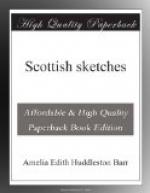After this Andrew never left Sinverness; but, the past unsighed for and the future sure, passed through
“——an old age
serene and bright,
And lovely as a Lapland night,”
until, one summer evening, he gently fell on that sleep which God giveth his beloved.
“For such Death’s portal opens
not in gloom,
But its pure crystal, hinged on solid
gold,
Shows avenues interminable—shows
Amaranth and palm quivering in sweet accord
Of human mingled with angelic song.”
One Wrong Step.
ONE WRONG STEP.
CHAPTER I.
“There’s few folk ken Ragon Torr as I do, mother. He is better at heart than thou wad think; indeed he is!”
“If better were within, better wad come out, John. He’s been drunk or dovering i’ the chimney-corner these past three weeks. Hech! but he’d do weel i’ Fool’s Land, where they get half a crown a day for sleeping.”
“There’s nane can hunt a seal or spear a whale like Ragon; thou saw him theesel’, mother, among the last school i’ Stromness Bay.”
“I saw a raving, ranting heathen, wi’ the bonnie blue bay a sea o’ blood around him, an’ he shouting an’ slaying like an old pagan sea-king. Decent, God-fearing fisher-folk do their needful wark ither gate than yon. Now there is but one thing for thee to do: thou must break wi’ Ragon Torr, an’ that quick an’ soon.”
“Know this, my mother, a friend is to be taken wi’ his faults.”
“Thou knows this, John: I hae forty years mair than thou hast, an’ years ken mair than books. An’ wi’ a’ thy book skill hast thou ne’er read that ‘Evil communications corrupt gude manners’? Mak up thy mind that I shall tak it vera ill if thou sail again this year wi’ that born heathen;” and with these words Dame Alison Sabay rose up from the stone bench at her cottage door and went dourly into the houseplace.
John stood on the little jetty which ran from the very doorstep into the bay, and looked thoughtfully over towards the sweet green isle of Graemsay; but neither the beauty of land or sea, nor the splendor of skies bright with the rosy banners of the Aurora gave him any answer to the thoughts which troubled him. “I’ll hae to talk it o’er wi’ Christine,” he said decidedly, and he also turned into the house.
Christine was ten years older than her brother John. She had known much sorrow, but she had lived through and lived down all her trials and come out into the peace on the other side. She was sitting by the peat fire knitting, and softly crooning an old Scotch psalm to the click of her needles. She answered John’s look with a sweet, grave smile, and a slight nod towards the little round table, upon which there was a plate of smoked goose and some oaten cake for his supper.
“I carena to eat a bite, Christine; this is what I want o’ thee: the skiff is under the window; step into it, an’ do thou go on the bay wi’ me an hour.”




